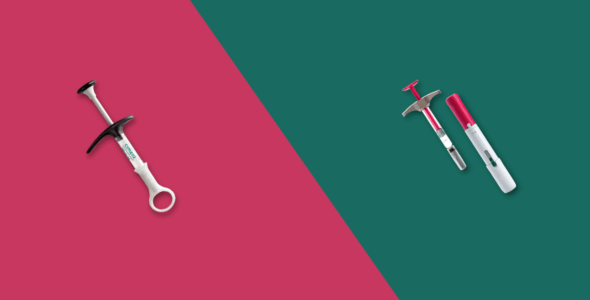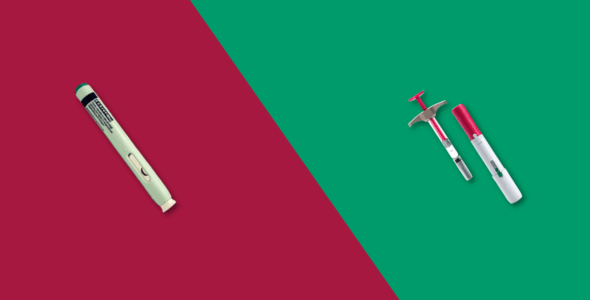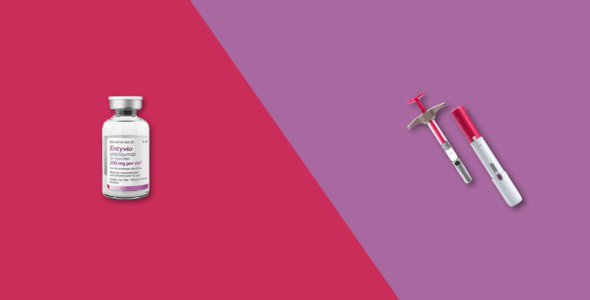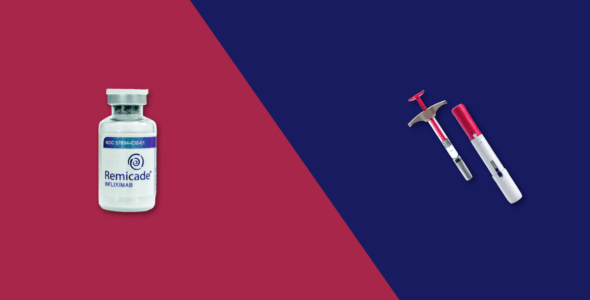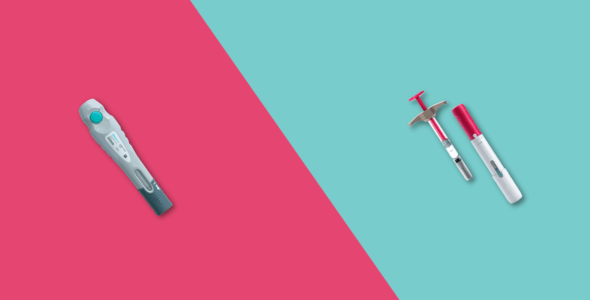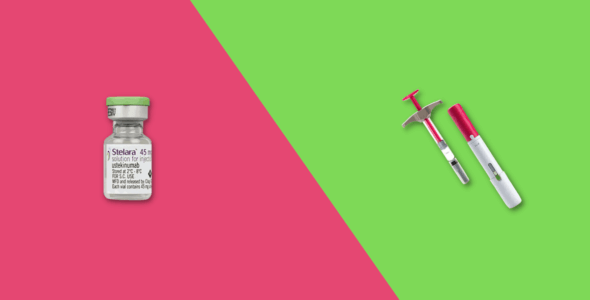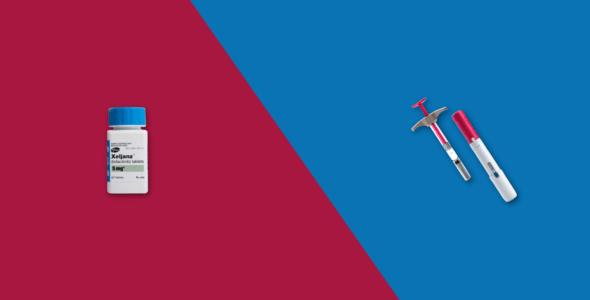Otezla and Humira are prescription drugs used to treat psoriatic arthritis (PsA) and plaque psoriasis. They can be used with other treatments such as phototherapy or topicals. Otezla is a disease-modifying antirheumatic drug (DMARD) non-biologic drug, made chemically from small molecules. Humira is a biologic medication, which means that it is made from living cells.
Both drugs are approved as treatment options for psoriasis by The American Academy of Dermatology in their treatment guidelines. Furthermore, The American College of Rheumatology recommends both drugs as treatment options in its psoriatic arthritis treatment guidelines. To learn more about how Otezla and Humira are similar and different read on.
What is Otezla used for?
Otezla is a medication manufactured by Celgene containing the active ingredient apremilast. It is approved by the FDA to treat adults with:
- Moderate to severe plaque psoriasis
- Moderate to severe psoriatic arthritis
- Mouth ulcers caused by Behçet’s disease
Plaque psoriasis, psoriatic arthritis, and Behçet’s disease can not be cured, but medications can help manage the conditions and reduce symptoms. Otezla can reduce the inflammation caused by your immune system that underlies these conditions, giving you relief from your symptoms and improving your quality of life.
What is Humira used for?
Humira is a brand-name drug manufactured by Abbvie containing the active ingredient adalimumab. It is approved by the FDA to treat the following inflammatory autoimmune diseases:
- Moderate to severe active rheumatoid arthritis in adults
- Moderate to severe active polyarticular (affecting multiple joints) juvenile idiopathic arthritis in children aged two years and older
- Moderate to severe chronic plaque psoriasis in adults
- Active psoriatic arthritis in adults
- Active ankylosing spondylitis in adults
- Moderate to severe active ulcerative colitis in adults
Humira is also approved to treat similar non-autoimmune inflammatory diseases:
- Moderate to severely active Crohn’s Disease in adults and children aged six years and older
- Moderate to severe hidradenitis suppurativa (HS) in adults and children aged 12 years and older
- Uveitis in adults and children aged two years and older
Methotrexate is commonly used with Humira.
The main differences are; Otezla is indicated to treat mouth sores in people with Behçet’s disease, Humira is not. Humira is indicated to treat non-autoimmune inflammatory diseases whereas Otezla is not. Otezla isn’t currently approved for use in children but some indications of Humira are for use in children.
How does Otezla work?
The active ingredient in Otezla is called apremilast. Apremilast works by blocking an enzyme in your body called phosphodiesterase 4 known as a PDE4 inhibitor. This enzyme is involved in the process your immune system uses to cause inflammation. By blocking this enzyme, apremilast interrupts this process, reducing inflammation in your body. This can reduce psoriatic skin plaques, limit swelling and pain in your joints, and help clear up and prevent mouth ulcers caused by Behçet’s disease.
How does Humira work?
Humira work as monoclonal antibodies and, more specifically as TNF blockers, to treat inflammation. TNF alpha (tumor necrosis factor-alpha) is one of several different antibodies produced by white blood cells and other parts of the immune system.
Once Humira is injected into your body, its active ingredient helps reduce inflammation. Your immune system releases a protein in your body to trigger inflammation called TNF-alpha (tumor necrosis factor-alpha). The active ingredient attaches to TNF-alpha and stops it from working. This limits the amount of inflammation your immune system can cause.
Other TNF blockers are Cimzia (certolizumab pegol), Enbrel (etanercept), Remicade (infliximab),Taltz (ixekizumab and Simponi (golimumab).
Other biologics available are Stelara (ustekinumab), Cosentyx (secukinumab), and Tremfya (guselkumab) work by selectively targeting the interleukins associated with psoriatic inflammation. Orencia (abatacept) is another drug that targets T-cells in the immune system reducing inflammation.
How do you take Otezla and Humira?
You take Otezla tablets by mouth twice daily. You are given Humira by subcutaneous injection (injecting it under your skin) using either a pre-filled syringe or an injectable pen. It is important to use a new needle each time to prevent the risk of infection. You may get injection site reactions such as redness, bruising, or irritation after administration, but this will settle down after a few hours.
Side effects of Otezla and Humira
Common side effects of both drugs are:
- Respiratory infection
- Headache
- Nausea
- Back pain
Otezla side effects
- Diarrhea
- Fatigue
- Decreased appetite
- Weight loss
Humira side effects
- Sinusitis
- High cholesterol
- Urinary tract infections
- Injection-site reactions
More serious Otezla side effects include:
- Severe allergic reactions to the medication
- Depression
- Thoughts of suicide
More serious Humira side effects include:
- Heart failure
- Increased risk of serious infections such as tuberculosis
- Cancer (lymphoma and other malignancies)
- Nervous system conditions such as multiple sclerosis and Guillain-Barré syndrome
Your health care provider can provide prescribing information and share more medical advice about Otezla and Humira including drug interactions. The FDA website is another source of information for you www.fda.gov to find out more.
How effective are Otezla and Humira?
Clinical trials of Otezla and Humira have found both drugs to be effective for treating psoriatic arthritis and plaque psoriasis.
What are the warnings of Otezla and Humira?
Talk with your healthcare professional about your health history before you take either drug. Otezla or Humira may not be suitable for you if you have certain medical conditions or take certain drugs and other factors that affect your health.
